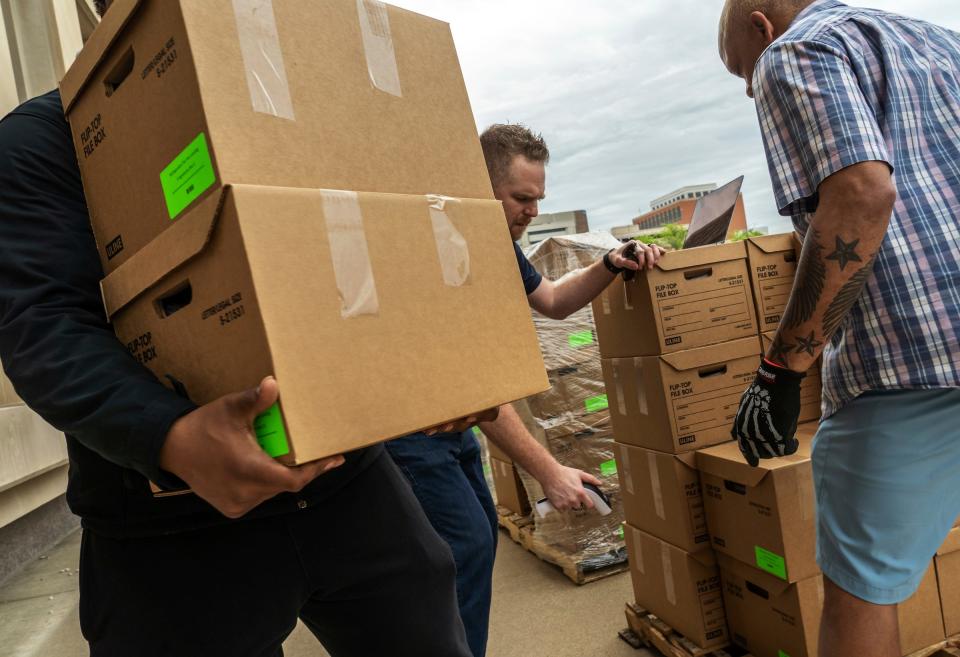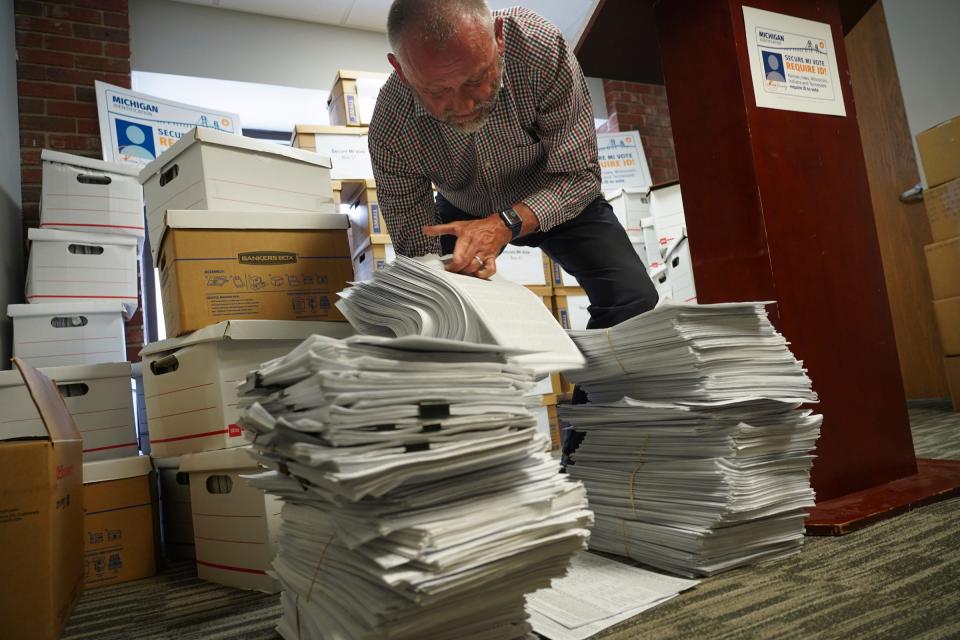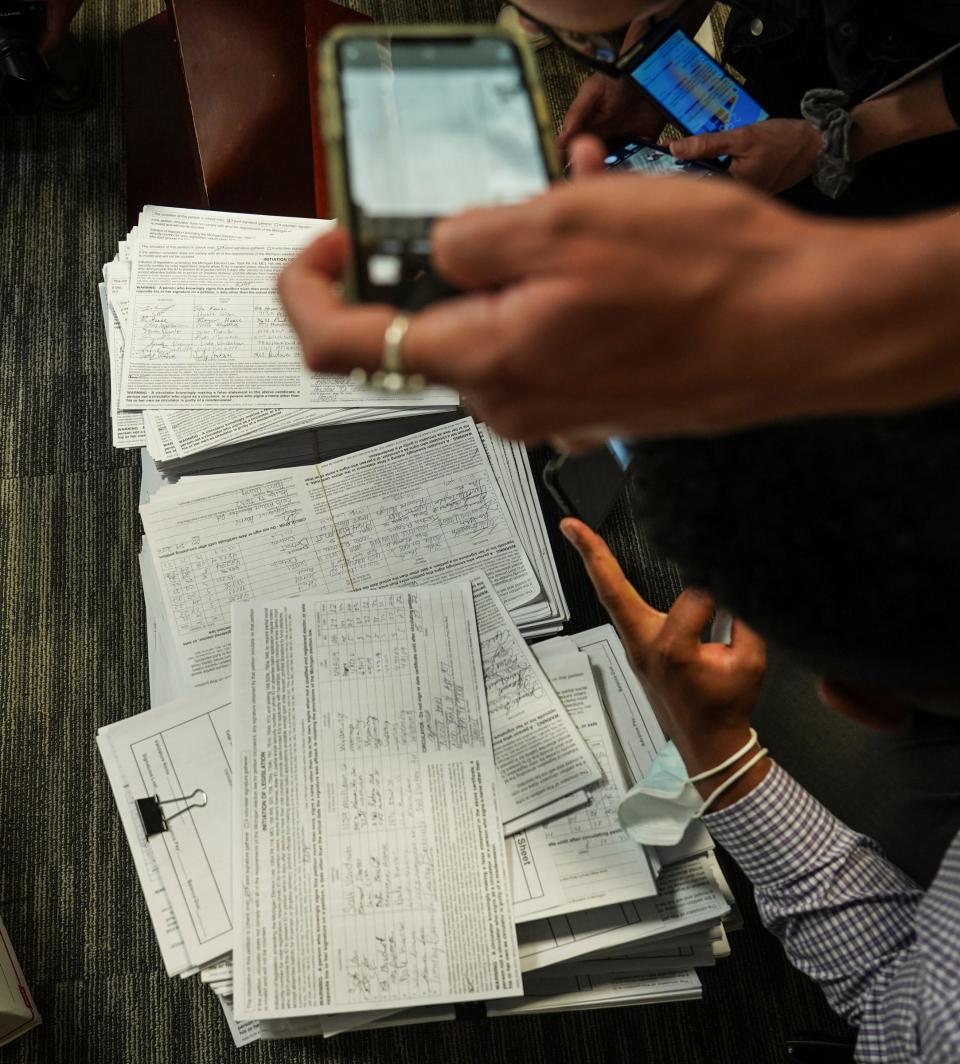Republican-backed Secure MI Vote, Let MI Kids Learn blow past filing deadline
On a day poised to see a slew of petition initiatives filed to change Michigan laws, only one campaign — an effort to cap payday loan interest rates — dropped off signed petition forms ahead of the filing deadline Wednesday to land a spot on the November ballot.
Meanwhile, two high-profile Republican-backed initiative petitions vowed to continue collecting signatures and file their petition forms in the coming weeks in hopes that state election officials will review them quickly despite blowing past the deadline.
Organizers for the Secure MI Vote to enact strict voter ID laws and the Let MI Kids Learn petition initiatives don't intend to put their initiatives on the ballot and hope instead that lawmakers would pass their proposals later this year.
Republican lawmakers have already passed bills mirroring those proposals, but Gov. Gretchen Whitmer vetoed the legislation. The initiative petition process, however, allows lawmakers to pass the same proposals without the governor's support.
Jamie Roe, a spokesperson for the Secure MI Vote initiative, called the Wednesday filing date "sort of an artificial deadline" and said that state election officials could review signatures the group plans to file so that the GOP-led Legislature could take up the proposal quickly.
Steve Liedel, an attorney who previously served as legal counsel to Democratic Gov. Jennifer Granholm, said organizers of initiatives who missed the filing deadline face a steep hill to climb if they want lawmakers to adopt their proposals before the end of the year.
"Anything submitted after this date is a proposal that could ultimately be submitted to voters at the 2024 ballot," he said. "And while the process provides for the Legislature to vote on them, the whole process is structured based on which election they’re going to be submitted to."
The bureau is preparing to administer two statewide elections and has an obligation to review petition initiatives that were submitted by the Wednesday filing deadline ahead of the 2022 election, Liedel said.
"There’s nothing that compels the board given everything else that they have on the plate in a very busy election year… to deal with something for the 2024 election. 2022 election first."
Organizers for other initiatives have already started looking to the next election, including a campaign to increase Michigan's minimum wage and another to add Michigan to a coalition of states aiming to decide presidential elections by the popular vote instead of the Electoral College.
Those campaigns have announced that they will try to make the 2024 ballot instead of putting their proposals before voters in the upcoming midterm.
Other initiative petitions missed the deadline to submit signatures, including those to limit the authority of local public health officials, establish a new credit system to reduce prison sentences, conduct another audit of the 2020 presidential election, legalize psychedelic mushrooms and decertify the 2020 presidential election.
Payday lending initiative files signatures
The Michiganders for Fair Lending proposal would cap interest rates on payday loans at a 36% annual percentage rate. It would void transactions above that rate, require a consumer warning spelling out the maximum allowable rate and empower the Attorney General's Office to prosecute those who charge above it.
Organizers behind the campaign showed up with stacks of boxes with petition forms outside the state's Bureau of Elections office.

Dallas Lenear, the group's treasurer, said that in most Michigan counties there are more payday loan stores than McDonald's and they are disproportionately located in low-income and rural communities where residents struggle to afford the high interest rates currently charged.
The group submitted more than 400,000 signatures, Lenear said.
In order to get the proposed legislation in front of lawmakers or on the ballot, sponsors of these petition initiatives had to collect at least 340,047 voter signatures.
Under Michigan election law, the Board of State Canvassers must determine whether the initiative obtained enough valid signatures. The board is next scheduled to meet June 23.
Let MI Kids Learn and Secure MI Vote blow past deadline, vow to submit signatures soon
The Let MI Kids Learn proposal to create a tax credit to fund scholarships to cover educational expenses such as private school tuition said in a statement that it will continue collecting signatures for a few weeks.
"We're going to be patient in achieving our goals because the stakes for our children are so high," said Let MI Kids Learn spokesman Fred Wszolek.
The Secure MI Vote initiative that proposes new voter ID requirements, election funding restrictions and a ban on unsolicited mailings of absentee ballot applications announced a similar plan.
Roe said at a news conference that he believed that the campaign had collected enough valid signatures but identified about 20,000 fraudulent signatures when reviewing the petition forms, prompting concerns and a need for additional review.

The group plans to hand over tho signatures to law enforcement and believes that some of the signatures were collected by the same circulators state election officials found committed forgery on nominating petitions filed by GOP gubernatorial candidates, Roe said.
Raise the Wage looks to 2024

Raise the Wage, an effort to increase Michigan's minimum wage to $15 by 2027, expressed similar concerns about the recent discovery of the alleged signature fraud scheme.
The group said in a statement it collected significantly more than the required 340,047 signatures but said it was going to wait to collect more signatures and submit them to state election officials in June to qualify for the 2024 ballot.
But the president of One Fair Wage, Saru Jayaraman, said in a statement that the Michigan campaign to increase the minimum wage decided to delay its own signature submissions "out of an abundance of caution."
"The most important thing for us is that one million Michigan workers get $15 per hour, and this is that path that ensures us that victory," Jayaraman said.
The Yes on Popular initiative to decide presidential elections by the popular vote rather than the Electoral College previously announced last December that it was also aiming to put its proposal to voters in 2024.
Unlock Michigan II ditches initiative effort altogether
Last year, the Republican-controlled state Senate and House passed the Unlock Michigan initiative petition to repeal the emergency powers law Whitmer used early on in the COVID-19 pandemic to issue health and safety restrictions. Organizers of that initiative also aimed to amend the state's public health code through the initiative petition process to limit emergency orders issued by the Michigan Department of Health and Human Services and local health officers to 28 days unless approved by the Legislature or local governing bodies.
But organizers of that initiative announced Tuesday that they wouldn't pursue the initiative petition process and instead focus on pushing lawmakers to enact legislation next year.
While Republican lawmakers in the GOP-controlled Legislature have expressed support for the so-called Unlock Michigan II proposal, it's possible they could lose their majority in the upcoming November election.
Michigan's initiative petition, explained
Lawmakers can choose whether or not to put initiative petition proposals on the ballot. If they don't enact the initiative, it goes to a statewide vote. Lawmakers can also choose to enact the proposed changes themselves.
If lawmakers do not take action within 40 session days, the proposed law will appear on the ballot. The proposals could also appear on the ballot if the Legislature proposes a different measure on the same subject, placing both proposals on the ballot for voters to approve.
But unlike the normal process lawmakers follow to change state laws, Michigan's initiative petition process allows lawmakers to bypass the governor's veto and enact the initiatives on their own. Not only can lawmakers enact voter-initiated legislation without the governor's support, they can do so without the support of a majority of voters in a statewide election.
Michigan stands out nationally in allowing lawmakers to approve legislation not subject to the governor's veto or approval in a statewide election.
Clara Hendrickson fact-checks Michigan issues and politics as a corps member with Report for America, an initiative of The GroundTruth Project. Make a tax-deductible contribution to support her work at bit.ly/freepRFA. Contact her at chendrickson@freepress.com or 313-296-5743. Follow her on Twitter @clarajanehen.
This article originally appeared on Detroit Free Press: Secure MI Vote, Let MI Kids Learn blow past filing deadline

